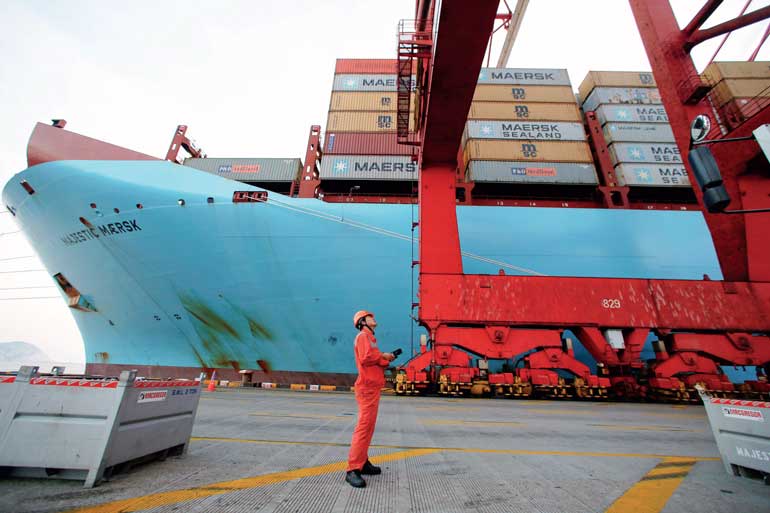Sunday Feb 22, 2026
Sunday Feb 22, 2026
Monday, 7 November 2016 00:01 - - {{hitsCtrl.values.hits}}
 A worker is seen next to the Maersk’s Triple-E giant container ship Maersk Majestic at the Yangshan Deep Water Port in Shanghai, China, 24 September – REUTERS/File Photo
A worker is seen next to the Maersk’s Triple-E giant container ship Maersk Majestic at the Yangshan Deep Water Port in Shanghai, China, 24 September – REUTERS/File Photo
Reuters: A.P. Moller-Maersk , the world’s biggest shipping firm, said the container business on which it is staking its future made a loss in the third quarter of the year as freight rates declined further.
Shares in the Danish company fell as much as 9% after profit in the three months to the end of September fell 44% and came in below forecasts. Low oil prices have depressed returns from the energy business which is the other main arm of the company.
The results underline the problems facing the family-controlled group which said in September it would focus its attention on building up its transport and logistics business, while creating a separate energy division.
The company stuck to its forecast for annual profit to be significantly below last year’s $3.1 billion.
“This is far from a satisfactory result for us,” said Soren Skou, who was appointed chief executive of the group in June and still heads the container business.
“We grew more than the market and gained some market share in the third quarter,” said Skou, adding that Maersk managed to increase market share following the collapse of South Korea’s Hanjin Shipping.
However, Maersk said average freight rates fell 16% in the quarter to $ 1,811 per 40-foot container as overcapacity hurts shipping companies.
A net loss of $ 116 million for its container unit, against analysts’ expectations of a $ 174 million profit, shows the pressures as it seeks to remain the world’s leading container shipping carrier amid a wave of mergers and acquisitions.
Reducing overcapacity
Recent industry deals have involved China’s COSCO, France’s CMA CGM and Germany’s Hapag-Lloyd .
Japan’s top three shipping firms Kawasaki Kisen, Mitsui O.S.K. Lines and Nippon Yusen said on Monday they planned to combine their container shipping operations in a joint venture that will have $ 19 billion in combined revenues and control 7% of global container capacity.
Maersk has a market share of around 15% but has been unable to secure better prices for shipping goods.
Skou said he expected freight rates to rise as the industry tackles overcapacity.
“Consolidation will in itself not affect the overcapacity, but I notice that companies have stopped ordering ships,” Skou said in a conference call.
“In addition, the idled capacity has increased to 6-7% of the global fleet, while scrapping has risen sharply with ships with an average age of 20 years being scrapped. So there is action being taken in the industry to bring down the overcapacity,” Skou said.
Net profit fell to $ 438 million for the three months to 30 September, below the $ 490 million expected by analysts in a Reuters poll.
Maersk, with a fleet of more than 600 ships, intends to develop its transport and logistics operations despite their problems, while creating a separate energy division combining Maersk Oil and three related companies.
The latter will be split from the main company individually or in combination “in the form of joint-ventures, mergers or listing”, within two years, the company said in September.